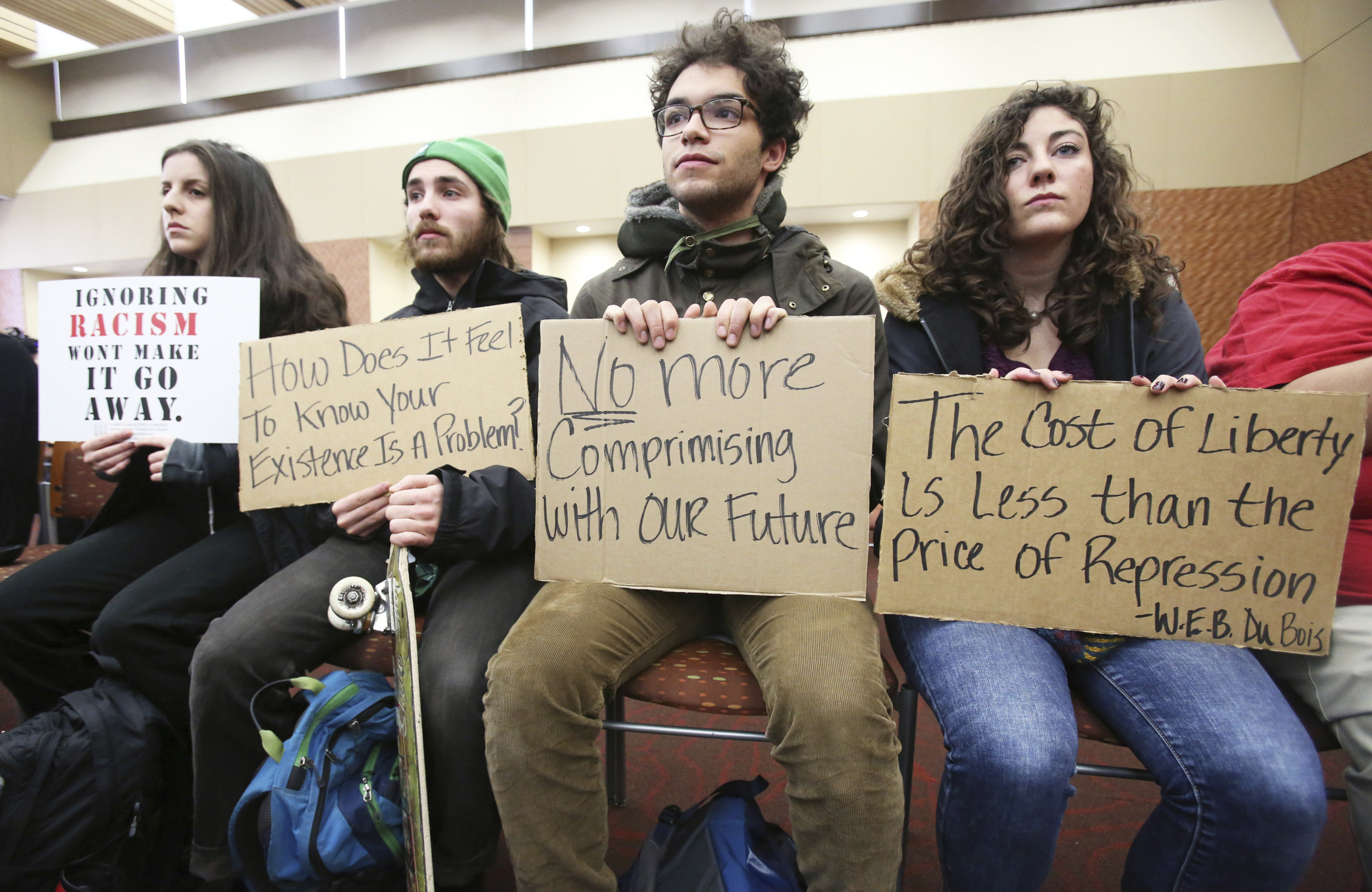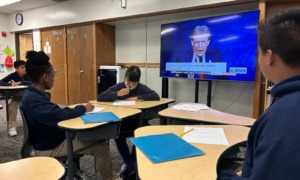This story was produced by The Hechinger Report, a nonprofit, nonpartisan news outlet focused on education.
Elected officials are pushing university presidents to categorically silence student speech on salient political issues. This runs afoul of the values of academic freedom and free speech.
In the case of public institutions, giving in to such pressure is unconstitutional.
Free speech is a vital liberty that the American Civil Liberties Union has fought to protect at all levels of government, on campuses and across society for over 100 years.
With the rest of the world, we’ve been anxiously watching the catastrophe unfolding in Israel and Palestine. These events have caused inconceivable pain to many and will have untold effects on our collective future.
It is precisely in moments of crisis and fear like this one that free speech is most important.
Once it becomes acceptable to silence one form of political speech, the rights of everyone to speak and dissent are at risk.
While the ACLU does not take positions on international conflicts, we must take positions when the rights of Americans to speak out about these crises are endangered.
Universities are supposed to be spaces where people develop, communicate and debate ideas, including the most topical, difficult and controversial ones.
Students, professors and others on campus must have the freedom to publicly speak about and debate matters of public concern — regardless of how radical or offensive their views are.
For that to work, school leaders must resist pressure to conflate protected political speech with prohibited harassment; making that mistake today will not only impact students now but for decades to come. Yet, troublingly, we’re seeing politicians and school administrators seeking to punish and censor students rather than ensure that all students are able to safely and freely speak their mind.
And the leaders aren’t just taking this problematic approach about speech pertaining to the conflict in the Middle East. For many years now, school administrators have sought to censor controversial speech, whether that’s canceling a book talk by right-wing Milo Yiannopoulos or removing artwork about reproductive health care from a campus exhibit.
The consequences for students are not hypothetical. In late October 2023, the State University System of Florida’s chancellor, Ray Rodrigues, in consultation with Gov. Ron DeSantis, ordered state universities to deactivate the Students for Justice in Palestine (SJP) chapters, based on nothing more than the national SJP organization’s political advocacy — which is protected political speech. That is a clear violation of the student groups’ rights to free speech and association, which is why we, ACLU of Florida, and Palestine Legal are now representing the University of Florida chapter of SJP in its legal challenge against Florida officials.
“Teachers and students must always remain free to inquire, to study and to evaluate or our civilization will stagnate and die.”
Chief Justice Earl Warren,
United States Supreme Court
Today, some in Congress seem to think there is, or should be, a “controversial speech” exception to the First Amendment.
But, if we learned anything from the experiences of our country’s universities during the McCarthy era and more recently in the years since 9/11, it’s that viewpoint-based efforts to police speech on campuses destroy the foundations on which academic communities are built.
Throughout U.S. history, people in power have attempted to silence students when they say things that the leaders find unpopular or offensive. During the Vietnam War, for example, universities tried to stop students on their campuses from creating chapters of the antiwar group Students for a Democratic Society by refusing to recognize them as a campus organization. This dispute went all the way up to the Supreme Court, which reaffirmed the group’s First Amendment rights.
That case, Healy v. James, is not an outlier. The Supreme Court has repeatedly held that students have a right to associate and speak out on matters of public concern, with Chief Justice Earl Warren famously stating 60 years ago (Sweezy v. New Hampshire, 354 U.S. 234; 1957) that either “teachers and students must always remain free to inquire, to study and to evaluate” or “our civilization will stagnate and die.”
Therefore, schools should not punish students, as some leaders have proposed, for chanting phrases like “From the River to the Sea,” “No Ceasefire,” “Make America Great Again” and “No Justice, No Peace,” regardless of how much they offend others.
To be clear: Antisemitism, anti-Muslim, anti-Palestinian and anti-Arab hate must be condemned and combatted. True threats and incitement are not protected speech. And colleges and universities have a moral and legal obligation to address harassment committed by, or directed at, members of their communities.
Nonetheless, students have a First Amendment right to use controversial slogans and to have differing opinions about what those slogans mean.
Congress cannot expect university administrators to be in the business of deciding which ideas and beliefs are acceptable for students to express and which should be silenced.
To do so would undermine the values of learning and expression on which all academic institutions are built. And while one group is at the center of such affronts today, other students, groups and speech could face similar attacks tomorrow.
[Related: Free speech, racial equity battles play out on Wisconsin campuses]
Universities must defend against bad actors who conflate suppression of speech with safety, because once it becomes acceptable to silence one form of political speech, the rights of everyone to speak and dissent are at risk.
Drawing the line between protected political speech and targeted harassment isn’t always easy, but the lines our leaders draw today are the ones that will apply across issues, views and debates for years to come.
***
Jenna Leventoff is senior policy counsel at the American Civil Liberties Union, covering free speech and technology for the ACLU’s National Political Advocacy Department.






























